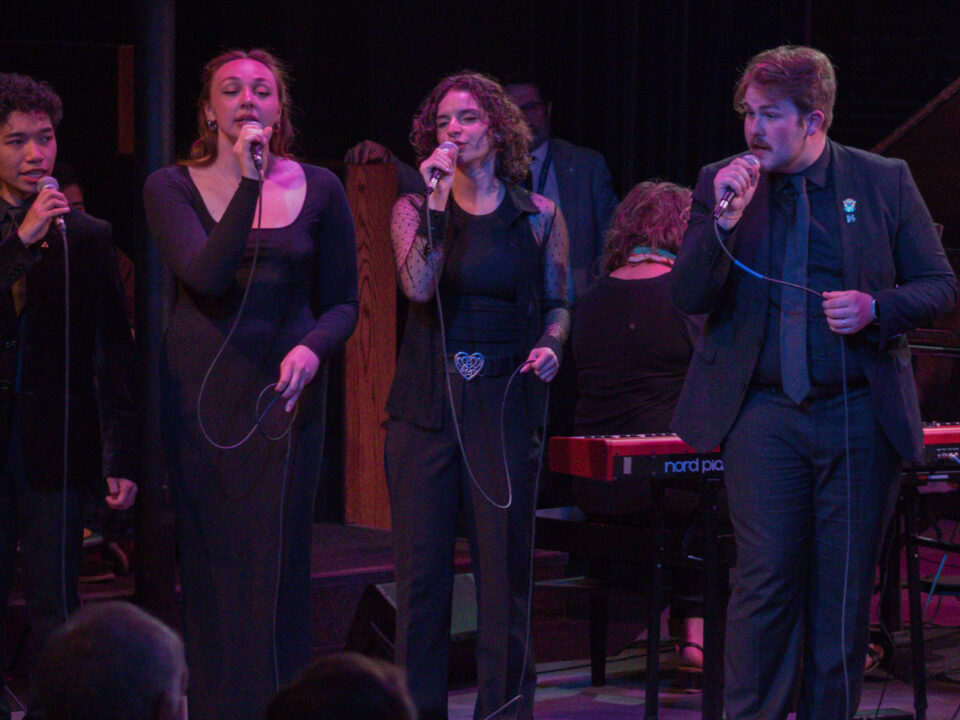First three episodes of ‘A Teacher’ leave audience with a lot to ponder
The new series on Hulu, “A Teacher,” begins and ends every episode with a message. The former gives us a warning, and the latter provides us with resources in the event we know somebody who is going through a similar experience. Maybe it’s ourselves.
I am not entirely up-to-date on TV, but I’ve only seen this kind of social responsibility on old Nick at Nite sitcoms, “Euphoria” (which, if you’ve seen “Euphoria,” you know what I’m talking about), and the final season of “Mr. Robot,” which had so much suicide and cruelty it would have actually been offensive for them to not acknowledge that, yes, these bad things happen. A little information goes a long way.
It takes a jerk to say warnings like those are pointless, because I think they’re as necessary as seizure cautions before big CG firework fests (of which there’s not nearly enough in theaters, but I digress).
However, I do think in the case of Hannah Fidell’s “A Teacher” (a reinterpretation of her 2013 film of the same) a warning might wrongfully urge viewers away from exploring the layered psychological dynamics between a troubled high school English teacher and an anxious star-athlete student. The warnings suggests that the only way to look at this all-too-common occurrence is with disgust rather than with an investigative lens for what kind of mindset it takes for a teacher to commit statutory rape.
Understandably, taking part in a discussion where you try to argue for the undeniable emotional drive of somebody like that will get you pelted with glares, as though you just played devil’s advocate for Nabokov’s Humbert Humbert. So let me quickly build a fort and say that I think all teachers should be punished equally for the lines they cross with their students. Whether it is a male or female teacher, it’s abuse.
That said, Fidell makes clear from the first episode that the teacher, Claire (Kate Mara), isn’t a monster. She isn’t even that much of a perv, and the senior-year student, Eric (Nick Robinson), she strikes a connection with isn’t blinding his way through the realm of the senses: He drinks to excess, parties with people who only want to talk about sex and have sex with each other’s younger siblings, and to top it off, he has an unchecked ego that is costing him a scholarship to a school that seems more like a sad pipe dream than an actual possibility.
Robinson, who isn’t even close to looking the age he’s playing (ultimately a good thing, as the original film’s casting was uncomfortably spot-on in terms of appearance), still delivers a resonant performance by giving the seemingly confident and outgoing Eric a twitchy vibe of constant uncertainty bubbling beneath his cool surface.
From the first three episodes, you can tell that nobody here is a paragon of propriety. Teachers drag from hidden flasks at school proms and make no secret about picking favorites; parents are oblivious at best and negligent at worst; the cops are bribable, and the husbands still think they can get a rock band off the ground. This depiction of a Texas suburbia is socially incestuous and just plain depressing.
The high points of these first three episodes is watching Eric’s grip fall away from him the more Claire becomes part of his life. It isn’t “love” at first sight, since the two of them spend most of the first episode unaware of each other. They do finally meet at the restaurant Eric works at. Their first interaction is less flirtatious and more awkwardly friendly, the way most teachers are with young students they’ve bumped into outside class. Watching them finally take notice of each other isn’t immediately as creepy as you’re expecting it to be. It’s actually nice. No legal or emotional boundaries are being crossed, and the chemistry between Mara and Robinson is so multi-dimensional that I forgot something terrible is bound to happen.
On paper, it may seem like Fidell (who wrote the first two episodes and directed all three) is too wrapped up in this twisted subject matter. This is not unfamiliar ground for Fidell, but this story has grander psychological aims than just being a retread, and it is a story that deserves the depth and layers of a miniseries.
The teacher of the film version (played there by Lindsay Burdge) acts like somebody who is engaged with a reverie rather than a felony. It’s sickening to watch, but because it’s a film, sickening is all it ends up being with the meek 75 minute runtime it had. Simply put, 2013’s “A Teacher” is just about a bad thing happening. But 2020’s “A Teacher” treats this conflict like much more than one bad thing: It’s the end of many different threads of many different bad things.
What we understand of Claire’s psyche in these 90 minutes is disappointment, numbness, bitterness and unchecked self-destructiveness, all of which are exhaustingly spread over Mara’s understated, yet thrillingly deep performance.
The episodes are well directed, especially the first episode, which makes brilliantly demonic use of LCD Soundsystem’s “oh baby,” sharpening and looping the closer destiny brings us to the inevitable bad thing that drew us to watching the show in the first place. The cinematography by Quyen Tran (this year’s “Palm Springs”) is slickly executed. The editing makes better use of social-media culture than most shows and movies trying to make texting and selfies interesting. You also get to enjoy neat split-screen work involving phone cameras, an impressive stylistic flourish that removes some of the sting from the big-time-cringe of watching a grown woman sexually latch onto a confused kid.
Through these early episodes viewers are lowered into Eric and Claire’s dreams of each other, both of which are romantically lit up as they yearn for each other, but then their dreams take us into darker territory, and the audience is forced to ask a question about themselves that goes beyond the story being presented: When our daily grip on our goodness loosens so we can sleep and unleash our minds, is what we dream our real expressions of desire, or just sexually frustrated casualties of a pornographic world? A world that encourages us to desire bodies over hearts and personal fulfillment over moral consequence.
The troubling final images of the third episode are of Claire taking Eric in the backseat of her car, and it is a moment that earns the warnings of the beginnings, but the way Fidell chillingly frames this scene impresses on the viewer an even stronger message that’ll keep them tuning in to see what’s next: These characters are not reaching for what their hearts truly want, but are instead ripping into the pathetic fabric of their latest distraction from growing up.


